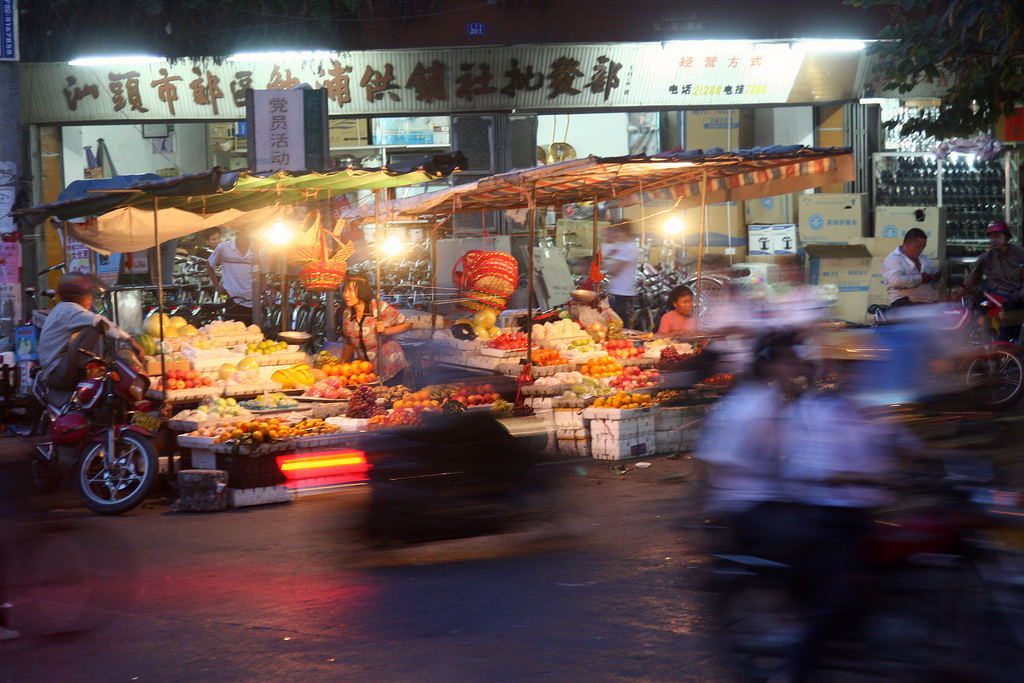"Province Towns" Separate Migrants from Shantou People
Ten o’clock is the busiest time for the old market in Tuopu every day, when you should speak loudly in order to make yourself be heard in two meters. It’s very hard to know what others are saying in this place where crowds of people are selling and bargaining. However that’s just for the left side where local residents live.
For the right side which is not near the busy road, it is so silent that everything seems still in a deep sleep, an anomaly in a country where boisterous street life is the norm. Most residents in the right side are migrant workers from Anhui, Guizhou and Jiangxi who go to work at five o’clock in the morning and come home late in the evening.
“This place is almost empty at the daytime. It’s hard to find a person to talk to,” said Zhang Lixia, an Anhui woman who resided in the right side of this Old Market in Tuopu for at least four years.”We don’t like blending with local people. Also, though there are many migrant workers in this small place. Often those from the same province live together,” added Zhang.
Zhang’s neighborhood in Tuopu could be called “Anhui town,” due to the high number of Anhui residents who live there. Similar to Chinatowns in foreign countries, migrant workers like Zhang often live in “province towns,” areas of the city where they live with relatives or people from the same province. They use their own dialect not standard Chinese, play and eat with people from the same province.
Though living in Shantou, the gap between them and the mainstream society is large. Like Robinson Crusoe, in Shantou those migrant workers are isolated in island-like neighborhoods, a phenomenon rooted in the government’s policies, the local people’s bias and by different culture or custom. What’s more, migrants themselves make the separation stronger by sticking to their “province towns.”
Migrants’ lives rely entirely on people from the same province. “We were introduced to Shantou by fellow villagers ten years ago, and our life here also depends on them,” said Zhang. Struggling for more than ten years in Shantou, Zhang and her husband owned a big shop (more than 100) to do wholesale business. They bought goods from Yiwu, Guangzhou and Jieyang. Most of their goods were sold to fellow villagers and Jiangxi people, who setting up a temporary stall with goods spread out on the ground for sale in downtown.
Migrants’ lives have little connection with local ones. “We do not mix much with the local people and we don’t like to mix with them so much,” Zhang said when she was helping a fellow villager to take care of his two kids on a sunny weekend. Those kids were studying in Jinleyuan Primary School with local kids. They played with the local classmates in school and when they back home they just played with kids from Anhui.
There are more than 150,000 migrant workers in Shantou, according to the Shantou government website. According to Shantou Special Economic Zone Evening, Huang Bingzhang, a representative of NPC in Shantou, said migrant workers were crowded in “City Villages” – under-developed areas of the city, resembling villages – and had a hard life.
Xiaogongyuan, Xidong, Jinlongcun and Longhucun were these kind of “City Villages” in Shantou where there are many “province towns.”
Language was a big problem, which contributed to separate migrants from local ones. “Some time we want to talk to the local people, but it’s very hard to understand what they are saying,” said Wang, a 60 year old Guizhou woman who had been Shantou for 3 years. Chao Shan dialect to them is just like French to Italian.
Bias of local people to migrants also made the “province towns” emerged. “The local people always look down upon us migrant workers. Working for the same restaurant, I do more work than local one, but only get 500-600yuan every month. That’s quite less than local one,” said Cai Lanxia, a 43 year old Anhui woman lived in Xiaogongyuan.
Low social status and a lack of respect upsets migrants who live with locals. “I have only a few local friends and they treat me not bad. Nevertheless, I always feel my status is lower than the locals,” said Mr. Zhou, a 46 year Henan man lived in Xiaogongyuan who earned 500-600 yuan per month by transporting goods with tricycle. He didn’t like to be a marginal man in this city. But for his kids to have good education and his family to have better life, he said he had to stay here.
Many local people thought they did not discriminate these outsiders, however most of them did not ever meet or talk with migrants. Even those local people who lived with migrants for years didn’t familiar with their neighbors.
“Migrant workers’ lives are quite mysterious to me. I just know my neighbors are from Anhui and Guizhou, but I haven’t got a chance to talk with them in more than one year,” said a local woman lived in Tuopu near Guizhou town.
Life is better in Shantou, according to many migrants in the “province towns.” However many migrants didn’t want to get the residence permit because that would mean losing their right to land ownership in their home province. “We make more money by doing business in Shantou than staying in Anhui on the farm. We don’t plan to register in Shantou to be a local residence, though it saves us 1400 yuan every year for kids’ education.” said Zhang, living a quite success life in Anhui town in Tuopu.
Zhang said in the near future, they would say goodbye to their successful business in Shantou and back home to be farmers again. “Shantou is a more developed city, but no matter how beautiful it is, it’s not our hometown,” Zhang added.


